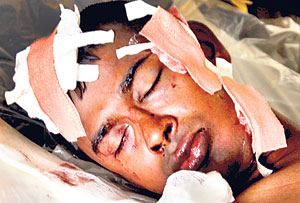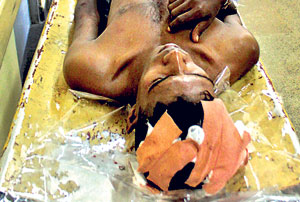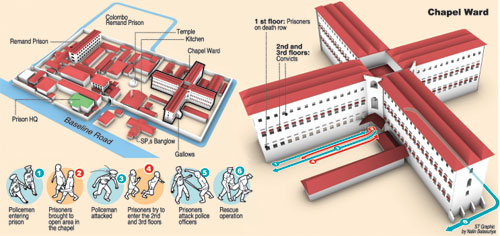Last Sunday, 64 police officers from police stations in Colombo and suburbs assembled at the Police Grounds in Bambalapitiya for what was described as a “special duty”.
In his briefing to the officers, Senior Superintendent of Police (Peliyagoda) Kithsiri Ganegama told the men they were to conduct a search operation at the Welikada Prison. The officers had little idea how many prisoners were involved, and how the search was to be carried out.
On November 6, at 7.30 am, the police officers left the Police Grounds in a bus and arrived half an hour later at the Welikada Prison. They had instructions from DIG (Crimes) Anura Senanayake that they were to search only Welikada’s “chapel ward”, which holds more than 2,400 prisoners.
In keeping with prison regulations, the police officers went in unarmed. They would little have suspected that they were walking into serious danger, and that this would be one of the most harrowing days in their police career.
The first sign that this could be a difficult day was when a prison official refused to allow them in because they did not have a search warrant. The police officers explained that the operation had been discussed with Prisons Commissioner General, Major General (Retd.) V. R. de Silva. It was a full half-hour before permission to proceed was granted. The prison officer then wanted to know how the police wanted to conduct their search. A senior police officer said they were under orders to search every prison inmate and all the prison cells.
The Sunday Times spoke to some of the police officers who took part in last Sunday’s ill-fated operation.
Constable W. M. Weerasinghe, of the Kandana Police, was one of the officers who were injured in last week’s prison riot.
“Some 10 prison officers joined us in the search operation,” PC Weerasinghe said. “We entered a narrow stairway. It was the only entry and exit point for that ward. We saw prisoners smoking. They seemed agitated to see us. Most of them were waiting to use the toilets. The jailors then ordered all the prisoners to line up in the middle of the chapel for inspection, and told us to proceed with the search. We found beedi, cigarettes, lighters and boxes of matches on the first few convicts.
 |
 |
| Police officers said prisoners stoned them and beat them with iron rods and sticks. |
 |
| Police ambulances at the scene of last Sunday’s riot at Welikada. Pix by M. Pushpa Kumara |
“We were checking prisoners from the second and third floors. We were under orders not to simultaneously check prisoners from the first floor, as these men were death-row convicts. After body-searching some 2,000 inmates, we left them in an open ground next to the chapel and proceeded to check their cells.
“The 10 policemen in our team were searching two cells on the second floor when we heard the prisoners shouting. They were aiming stones at us from the ground floor. A gang started to assault a Superintendent of Police. The officer, who was bleeding from his head, ran into the chapel. “At that point, the convicts broke down a locked gate and charged into the chapel and started to attack policemen. Some were carrying sticks and heavy objects.
“The prisoners then broke a second gate leading to the cells on the second floor, where we were. The 10 of us ran into a cell and locked ourselves in. In the pandemonium, one prisoner said he would help us out if we opened the cell door. We were stuck in the cell for about 45 minutes before a jailor told us it was safe to come out. He escorted us out. The prisoners shouted, telling us to remove our caps and shirts. We could see other police officers being beaten up. Some had been stripped naked.
“As we were nearing the chapel exit, I was dragged out and beaten. I managed to break away. I ran towards an office room near the chapel. Two prisoners told the mob to leave me alone. One of the two men gave me water to drink, and the other offered to lead me out of the prison through a short-cut. When we were taking the short-cut, another gang of prisoners came up and demanded my wallet. They tore off the gold chain round my neck and took my wallet and told me to leave. I saw another prisoner using his teeth to tear a gold ring off a policeman’s hand.
“I finally reached the entrance gate, where about 40 jailors were blocking the way. They didn’t believe I was a policeman and wouldn’t let me out. It was 15 minutes before I finally got out. I jumped into a police jeep and was rushed to the Colombo National Hospital. My head was bleeding badly.”
Constable S. R. Lalith, 24 years, of the Moratuwa Police, thanks a prison inmate for saving him from the prison mob.
“I was on the third floor searching cells with a six other policemen when I heard shouting. Prisoners carrying iron rods, clubs and broomsticks made their way to the top floor and started to assault us. My wallet, gold chain and cell phone were taken. I thought I would be killed. I pretended to faint. At that point, one of the prisoners ordered the mob to get off me. He said I had helped him in the past. It is true. He was caught by the Moratuwa Police for selling drugs and kasippu, and when he was in custody I gave him tea a couple of times. I was good to him. He handed me over to one of the jailors, and I was rushed to hospital.”
A senior jail guard who was on duty at Welikada last Sunday said the trouble began when a senior police officer co-ordinating the raid chose to ignore the jailors’ advice about entering the prison discreetly, without provoking the inmates.
“He wouldn’t listen to us,” the jail guard, who did not want his name mentioned, told the Sunday Times. “The officer joked that most of the prisoners were known to him and that it was he who had helped put them in prison. This officer was badly beaten up. The prisoners pointed to various policemen, saying they had planted drugs in their homes and were sleeping with their wives while they were rotting in prison.”
According to Commissioner General of Prisons, Major-General V. R. de Silva, the police officers in last Sunday’s search operation had turned up at Welikada without a court order and were unprepared to handle such a large number of prisoners.
“The Inspector General of Police, Mahinda Balasuriya, called me last Friday to say he had a court order to search all prisons in the country,” Major-General Silva told the Sunday Times. “He asked for my help when the police arrived at Welikada. I said okay. But on Saturday, I had a call from DIG Anura Senanayake, who said the prison raids had been postponed.
“On Sunday, I was informed by DIG K. P. P. Pathirana that a police team was on its way to Welikada. I expected to see a large team, but there were only 64 policemen, and they had come without a court order. They told the guards that I had given them permission to conduct the operation. The police sent 64 officers to search 2,464 prisoners. These are all hardened criminals serving long-term sentences. The prisons officers cannot be blamed for what happened.
“Whenever the prison conducts a search, we do it one prisoner at a time. The police took all the prisoners out, giving them the opportunity to gang up and riot,” he said. “A committee of senior prisons department officers is investigating last Sunday’s riot.
According to Vijith Vijayamuni, Deputy Minister of Prison Reforms and Rehabilitation, the police came to Welikada Prison without authorisation and without sufficient manpower. “They also come at a very inconvenient time, when the prisoners were waiting to use the toilets,” Mr. Vijayamuni told the Sunday Times. “The toilet facilities are limited, and the prisoners have to await their turn. This was one of the main reasons for the anger and violence.”
According to Anura Senanayake, Deputy Inspector General of Police, Crimes Division, the safety of the police officers who conducted the raid was the jailors’ responsibility. The jailors had failed on this occasion, he said.
“In an operation like this, we should have had at least 30 jailors for our protection, but we were given only 10. We were told the prison had only 600 inmates, so we put 75 officers on the job. If we had known there were 3,000 inmates, we would have sent more men. The jailors released all 3,000 inmates for the search. We wonder whether there was some understanding between the jailors and the prisoners.
“Certainly on this occasion, the prisons staff let the police down badly.” |





